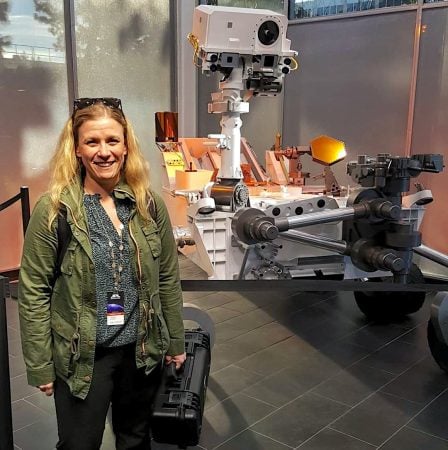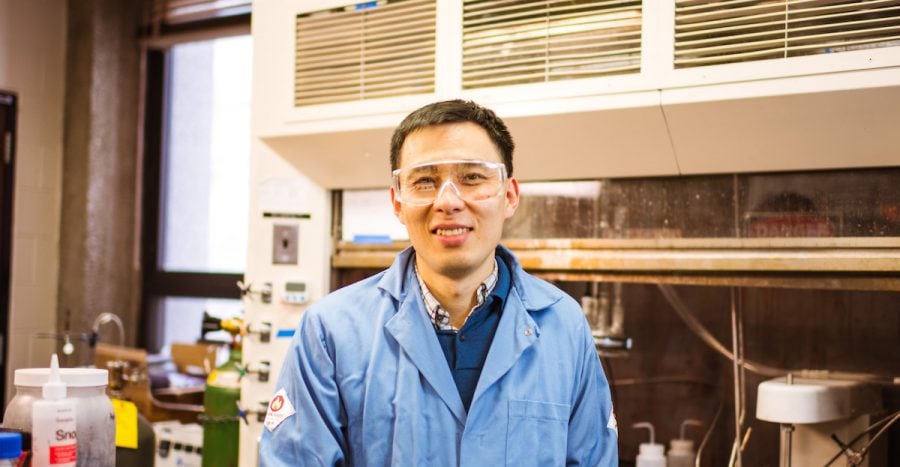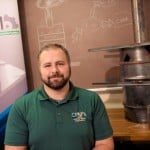
(All images courtesy Jessica Elwell)
A chemical engineer who almost chose music as a major and went on to work on a project that was named one of Time Magazine’s Best Inventions of 2023 has been selected as speaker for the First Year Engineering Lecture Series.
Her talk takes place at 6 p.m. Monday, Aug. 26, in Michigan Tech’s Rozsa Center for the Performing Arts.
Elwell, chief operating officer at OxEon Energy, has built a career in technology and innovation, supported by her bachelor’s and master’s degrees in chemical engineering from Michigan Tech.
”I chose to go to a school where I knew no one, and into chemical engineering a bit unprepared—a year-and-a-half prior, I had planned to be a music major,” Elwell says. She knew it would be difficult, but was a strong student in high school and felt confident she could forge ahead. “It was an amazing amount of work, with a tight-knit group of students, and an impressive amount of fun all wrapped up in a single year. And the snow … I remember walking on campus during the first snow and thinking, “It’s October…”
Elwell’s talk, which is not open to the public, is part of the College of Engineering’s annual series that gives students an opportunity to hear about many different career paths—and the opportunities they have to impact the world—by interacting with some of the most innovative engineering leaders in the nation.
“I remember sitting in an auditorium seat during the first week of engineering school, somewhere between dream and reality, thinking about all the possibilities that lay ahead,” she says. “Career paths, projects, ways that this degree would make a difference. The room was buzzing. I’m excited to be in that atmosphere again, to—25 years later—have that chance to take a look back at the full path, and feel that excitement in the air!”
After earning her bachelor’s in 2002 and her master’s in 2003, Elwell began her career at SC Johnson as a research engineer. But, as she previously related in Stories From Husky Nation on Michigan Tech News, Elwell frequently jumped industries in search of positions that would add to her skill set.
With experience spanning renewable energy, aerospace, defense, and specialty chemicals, Elwell has managed high-profile projects for the U.S. Department of Energy (DOE), U.S. Department of Defense, and NASA, including the MOXIE system on NASA’s Perseverance Rover, which produced oxygen from Mars’ carbon dioxide and was recognized as one of TIME Magazine’s Best Inventions of 2023.
Elwell’s leadership continues to drive OxEon’s growth and innovation, as evidenced by her securing a $36.5 million DOE grant to scale manufacturing for products aimed at decarbonizing industries.
Holding six patents and numerous publications, Jessica’s influence extends beyond her company through board roles with the United States Hydrogen Alliance, Utah Business, and 47G, while actively supporting small businesses and STEM education in Utah, mentoring young women, and promoting energy equality and diversity.
Asked if she had ever envisioned where she’d be in her career today, Elwell says she always knew she wanted to contribute value to whatever team she was part of. “I don’t think anyone starts their freshman year thinking, ‘I’m going to help lead the first team to make oxygen on Mars.’ I couldn’t have anticipated the opportunities that would come my way, but I was ready to seize them when they did,” she says. “I initially thought I would work in product development, which I did, but I never could have imagined where that journey would lead me.”



